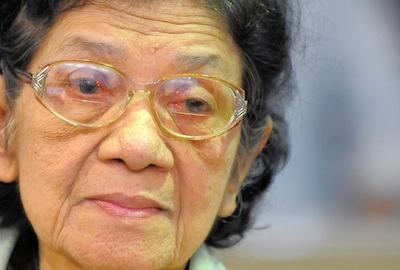Khmer Rouge “First Lady” too senile for punishment
Former Khmer Rouge minister Ieng Thirith attends the Extraordinary Chambers in the Court of Cambodia (ECCC) in Phnom Penh on April 30, 2010.
Another month, another crippling setback for the Khmer Rouge trials.
Ieng Thirith, the 80-year-old sister in law of reviled communist revolutionary Pol Pot, belongs to a quartet of Khmer Rouge leaders who held power during the communist regime's hyper-violent killing spree in the 1970s.
All are old and frail.
But the passage of time has left Thirith, the so-called "First Lady" of the Khmer Rouge, with serious dementia, her lawyers say.
The judges now agree: her "progressive, degenerative illness (likely Alzheimer’s disease)" has rendered her "unfit to stand trial," according to a statement released by the courts.
Thirith is now a free woman. But it is an indisputable, historical fact that she occupied the Khmer Rouge's highest rungs of power during its horrific killing spree. She is directly accused of "crimes against humanity" and "genocide" during Khmer Rouge reign, which left 1.7 million dead from force labor, starvation, sickness and systematic murder.
So what's next for the Khmer Rouge's first lady?
Probably wasting away at home. The courts mandate that she can't meddle with witnesses or evidence (which she is probably too senile to do anyway) and she can't leave Cambodia (which she probably had no intention of doing). She's asked to refrain from giving interviews. She'll be medically reevaluated each year.
As Global Post reported last month, the trials are teetering on financial collapse. Judges have quit and accused the government of undermining the trials.
But this is the first time since the trials began that Khmer Rouge victims have had to watch one of regime's key architects face judges only to turn around and walk free.
We want to hear your feedback so we can keep improving our website, theworld.org. Please fill out this quick survey and let us know your thoughts (your answers will be anonymous). Thanks for your time!
